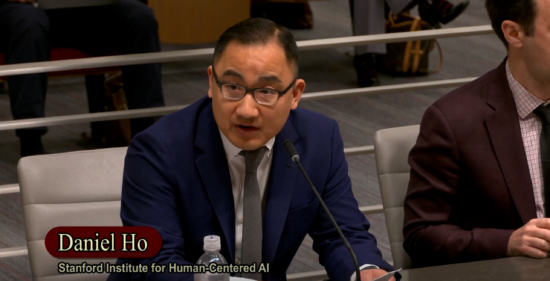Stanford Law’s Dan Ho Testifies Before the California State Senate
Stanford Law’s Daniel Ho, William Benjamin Scott and Luna M. Scott Professor of Law, Professor of Political Science, Professor of Computer Science (by courtesy), Senior Fellow at the Stanford Institute for Human-Centered Artificial Intelligence (HAI), Senior Fellow at the Stanford Institute for Economic Policy Research, and Director of the Regulation, Evaluation, and Governance Lab (RegLab), testified before the California State Senate on “California at the Forefront: Steering AI Towards Ethical Horizons”. Below is his video testimony (beginning at 17:24) and written testimony.

California is the innovation capital of the world. As a nation, it would be the fifth-largest economy. It houses 35 of the top 50 AI companies. Its educational institutions – from UC Berkeley to Stanford University to Caltech – are the envy of the world. Since World War II, the nation and California’s partnership between government, universities, and private industry catalyzed fundamental advances that gave us microchips, GPS systems, and the worldwide web. Yet this post-war model for innovation is under threat when it comes to AI.
- One: AI research has become so capital-intensive that only a handful of private companies are at the frontier of the field. Vast amounts of computational power and data require huge capital investments. The innovation ecosystem has increasingly become more closed, concentrated, and opaque. That hurts science, accountability, and innovation.
- Two: Governance of this technology, as called for by the Governor’s executive order and much proposed legislation, is fundamentally challenging because government lacks AI expertise. Fewer than 1% of AI PhDs pursue public service. And government cannot govern AI if it does not understand AI.
- Three: Many governmental systems still rely on “dinosaur technology.” Some 46M Americans turned to unemployment insurance during the pandemic, but twelve states, including California, still rely on dated software language from 1959. The system buckled, going from a timeliness rate of 97% to just above 50%.
So my core message to you is this: AI presents an extraordinary opportunity for the government and the people of California. But we must refrain and reject science fiction images of technology replacing humans: the best AI systems will support humans, not replace them.

